-
Views
-
Cite
Cite
Donald Palmer, Christopher B. Yenkey, Drugs, Sweat, and Gears: An Organizational Analysis of Performance-Enhancing Drug Use in the 2010 Tour de France, Social Forces, Volume 94, Issue 2, December 2015, Pages 891–922, https://doi.org/10.1093/sf/sov046
Close - Share Icon Share
Abstract
This paper seeks a more comprehensive explanation of wrongdoing in organizations by theorizing two underexplored causes of wrongdoing related to an organizational participant's embeddedness in formal organizational structures and informal peer relationships: the criticality of a person's role in their organization's division of labor, and their social ties to deviant peers within their organization and industry who vary with respect to their experience with social control agents. We investigate how these factors influenced wrongdoing in the context of professional cyclists' use of banned performance-enhancing drugs (PEDs) in advance of the 2010 Tour de France. This empirical setting provides two advantages: it permits evaluation of a wider range of potential determinants of wrongdoing than is conventionally possible, and it allows for the use of a measure of wrongdoing that is not subject to the type of bias that plagues most previously used indicators. We find substantial support for our prediction that actors who perform critical organizational roles are more likely to engage in wrongdoing. Further, we find that while undifferentiated social ties to known wrongdoers did not increase the likelihood of wrongdoing, ties to unpunished offenders increased the probability of wrongdoing and ties to severely punished offenders decreased it. These effects were robust to consideration of other known causes of wrongdoing in organizations: weak governance regimes and permissive cultural contexts, performance strain, and individual propensities to engage in wrongdoing.



